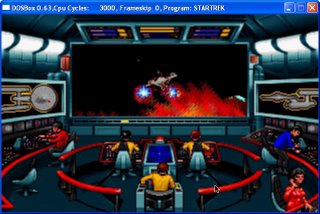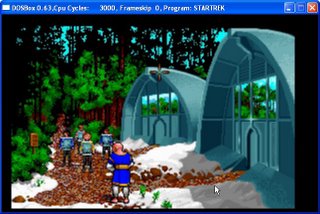To be fair, most of Activision’s Star Trek games were lousy. The best of the bunch was easily Star Trek: Bridge Commander, a nearly flawless space-combat sim which was the game that Starfleet Academy should have been. The original Star Trek Voyager: Elite Force was almost as good as Bridge Commander-the only modern Trek game where you felt as if you were really exploring unknown places in the Star Trek universe, but it was too short. Star Trek: Armada was actually a pretty good game, too, but I’m dinging it because the Borg were seriously underpowered. They should have been like the Antarans in MOO II, but they were just slightly more powerful than the other factions. The rest of the games were tepid and uninspired (anyone remember Star Trek: Away Team? I didn’t think so.)
The problem with most of the Activision titles is that in an attempt to lure “mainstream” gamers, they had simply grafted situations and characters from Star Trek into generic game types in an uninspired and by-the-numbers sort of way. They were counting on the Star Trek cachet to overcome lazy design. The whole premise of Star Trek –the premise that has inspired billions of people --is the exploration and development of space for the betterment of all humanity. For the most part, the Star Trek computer games from the late 90s and early 2000s were basically mindless action games. This disconnect alienated the core audience, while the mainstream gamers were just put off by the stoooopid gameplay. When I play a Star Trek game, I want to "go boldly where none have gone before" — not shoot an improbable monster with an equally improbable handheld photon torpedo launcher, like in Elite Force 2. Boy, that game was a big disappointment.
 To be a good Star Trek game, you have to have the creativity, awe, wonder, and generalized joie de vivre that Star Trek at its best displays in abundance. If you’re thinking “Man, that sounds like the perfect recipe for an adventure game…” you’d be completely right. The best Star Trek computer games have been adventure games: Interplay’s Star Trek:25th Anniversary (1992) and Star Trek: Judgment Rites (1994), and Spectrum HoloByte’s Star Trek: The Next Generation – A Final Unity (1995). These games were all enormously successful (in a way that none of the Activision games were) from both a creative and financial standpoints. The writing was excellent, capturing the feel of the series as well as the easy interaction between the characters. The plots were involved, making you feel as if you were leading a landing party to explore unknown worlds.
To be a good Star Trek game, you have to have the creativity, awe, wonder, and generalized joie de vivre that Star Trek at its best displays in abundance. If you’re thinking “Man, that sounds like the perfect recipe for an adventure game…” you’d be completely right. The best Star Trek computer games have been adventure games: Interplay’s Star Trek:25th Anniversary (1992) and Star Trek: Judgment Rites (1994), and Spectrum HoloByte’s Star Trek: The Next Generation – A Final Unity (1995). These games were all enormously successful (in a way that none of the Activision games were) from both a creative and financial standpoints. The writing was excellent, capturing the feel of the series as well as the easy interaction between the characters. The plots were involved, making you feel as if you were leading a landing party to explore unknown worlds. The aptly named 25th Anniversary was released in 1992 as part of Star Trek’s 25th Anniversary celebration, and really captured the spirit of The Original Series. Of course, you played the role of Captain James Kirk. The game was perfectly balanced between two components: Manuvering the Enterprise in space, including combat with Romulan, Klingon, and the Orion-like Elasi pirates, and the landing parties, which were straightforward adventure game elements. The game was divided into a clever episode structure: At the beginning of each episode, you were given assignments by Starfleet Command
The aptly named 25th Anniversary was released in 1992 as part of Star Trek’s 25th Anniversary celebration, and really captured the spirit of The Original Series. Of course, you played the role of Captain James Kirk. The game was perfectly balanced between two components: Manuvering the Enterprise in space, including combat with Romulan, Klingon, and the Orion-like Elasi pirates, and the landing parties, which were straightforward adventure game elements. The game was divided into a clever episode structure: At the beginning of each episode, you were given assignments by Starfleet Command  that you would have to complete, and Starfleet would assess your performance. The landing parties featured a slick interface that was hands-down just better than the competing Sierra interface. Everything about the game felt right, from the way the Enterprise handled in combat to the McCoy-Spock banter. Plus, unlike most adventure games, the puzzles didn’t seem forced. They always tied into the plot in a logical and cohesive fashion, and there was always at least two or three ways of completing a mission. There was also a wonderful bit of homage humor: Every episode featured numerous ways of killing the red-shirted security officer that accompanied your landing parties. However, if you killed too many, Starfleet would eventually give you a scolding…
that you would have to complete, and Starfleet would assess your performance. The landing parties featured a slick interface that was hands-down just better than the competing Sierra interface. Everything about the game felt right, from the way the Enterprise handled in combat to the McCoy-Spock banter. Plus, unlike most adventure games, the puzzles didn’t seem forced. They always tied into the plot in a logical and cohesive fashion, and there was always at least two or three ways of completing a mission. There was also a wonderful bit of homage humor: Every episode featured numerous ways of killing the red-shirted security officer that accompanied your landing parties. However, if you killed too many, Starfleet would eventually give you a scolding…Star Trek: Judgment Rites featured the if-it-ain’t-broke-don’t-fix-it philosophy of which I am so fond, keeping the interface and structure that worked so well in the first game, but including some evolutionary improvements over 25th Anniversary, such as the ability to skip the starship combat sequences and a strong plot that linked all of the missions together. It is justifiably considered a masterpiece today; its easily on my top 10 list and its definitely my favorite adventure game. A sequel (written by D. C. Fontana, no less!) was reportedly brought to a late beta stage (including recordings from all of the original cast, even the late DeForest Kelley) and canceled. That’s one of the great decisions which has led to Interplay going out of business…
 Star Trek: The Next Generation – A Final Unity was an amazing accomplishment. It featured the same starship combat-away mission setup as the Interplay games, (although the starship combat was less fun than in the Interplay titles, which is why its my second-favorite adventure game) all done in amazing SVGA graphics. It was also one of the first CD-ROM games to take advantage of the new medium, and featured excellent cutscenes as well as the incredible voice acting of the entire cast. Patrick Stewart’s script reportedly was over four inches thick! The plot was excellent and would have made a vastly better and more cinematic movie than any of the Next Generation movies that did get made. The best part was the relative freedom of choice the game offered. Example: on the show, Worf is always offering prudent suggestions that the crew ignores (which subsequently gets them into trouble). The best part about this game was that you could actually follow Worf's advice! Amazing. These games were all wildly successful because they gave the player a fun, balanced, and complete Star Trek experience, with equal doses of exploration, adventure, and strategy. I think that the success of these games can simply be attributed to the fact that you really did feel as if you were the Captain of the Enterprise.
Star Trek: The Next Generation – A Final Unity was an amazing accomplishment. It featured the same starship combat-away mission setup as the Interplay games, (although the starship combat was less fun than in the Interplay titles, which is why its my second-favorite adventure game) all done in amazing SVGA graphics. It was also one of the first CD-ROM games to take advantage of the new medium, and featured excellent cutscenes as well as the incredible voice acting of the entire cast. Patrick Stewart’s script reportedly was over four inches thick! The plot was excellent and would have made a vastly better and more cinematic movie than any of the Next Generation movies that did get made. The best part was the relative freedom of choice the game offered. Example: on the show, Worf is always offering prudent suggestions that the crew ignores (which subsequently gets them into trouble). The best part about this game was that you could actually follow Worf's advice! Amazing. These games were all wildly successful because they gave the player a fun, balanced, and complete Star Trek experience, with equal doses of exploration, adventure, and strategy. I think that the success of these games can simply be attributed to the fact that you really did feel as if you were the Captain of the Enterprise. Back to the point: The new games look visually appealing; there are a bunch of nice screenshots from Bethesda and a Q and A up at GameSpot. In the Q and A, the developers and production team are saying all of the right things. Unfortunately, apparently it is going to be (yet another) simulation of starship combat. I like starship combat as much as the next person, but it would be nice if they tried something more original and different. Two Starfleet Academy, four Starfleet Command, one Bridge Commander and a Dominion Wars later I think that particular dead horse has been well and truly flogged.
The single-player Star Trek game that I would love to see would be a Star Control 2-like top-to-bottom simulation of commanding a starship, including adventure, RPG, and space-combat sim elements. Call it a linear mix between Battlecruiser 3000 AD and Knights of the Old Republic. I feel that a deeper and more varied game that allows the player complete freedom of action is not only comletely possible using modern technology but would work really, really well as a game in its own right. Another idea that would be great to see is an updated Birth of the Federation-style strategy game that used elements from the entire series. Hopefully, if the new Bethesda game is good enough to generate strong sales they'll think a little more out of the box for the next one.





Amazing article... Final Unity is still among my favorite games...
ReplyDeleteCheers